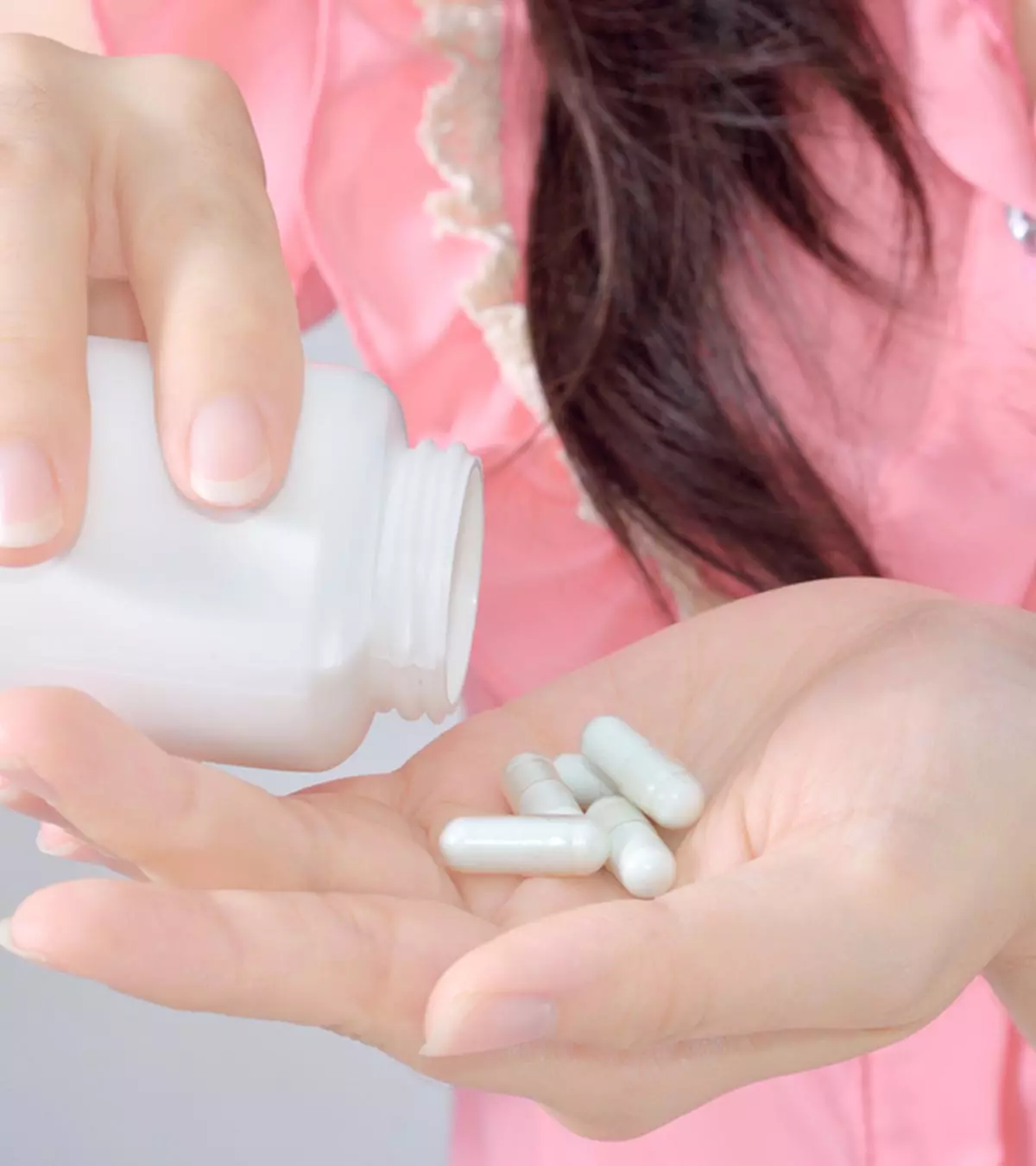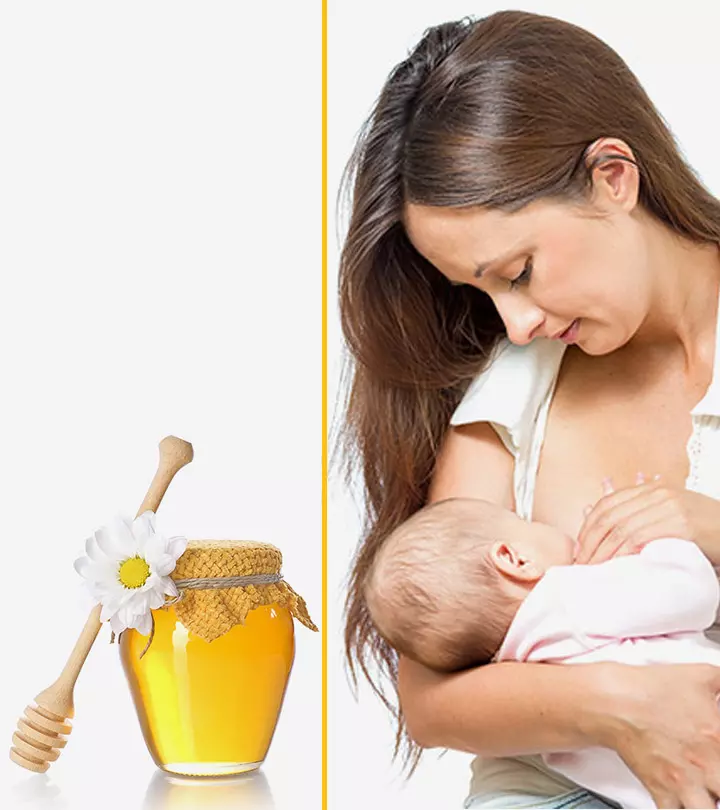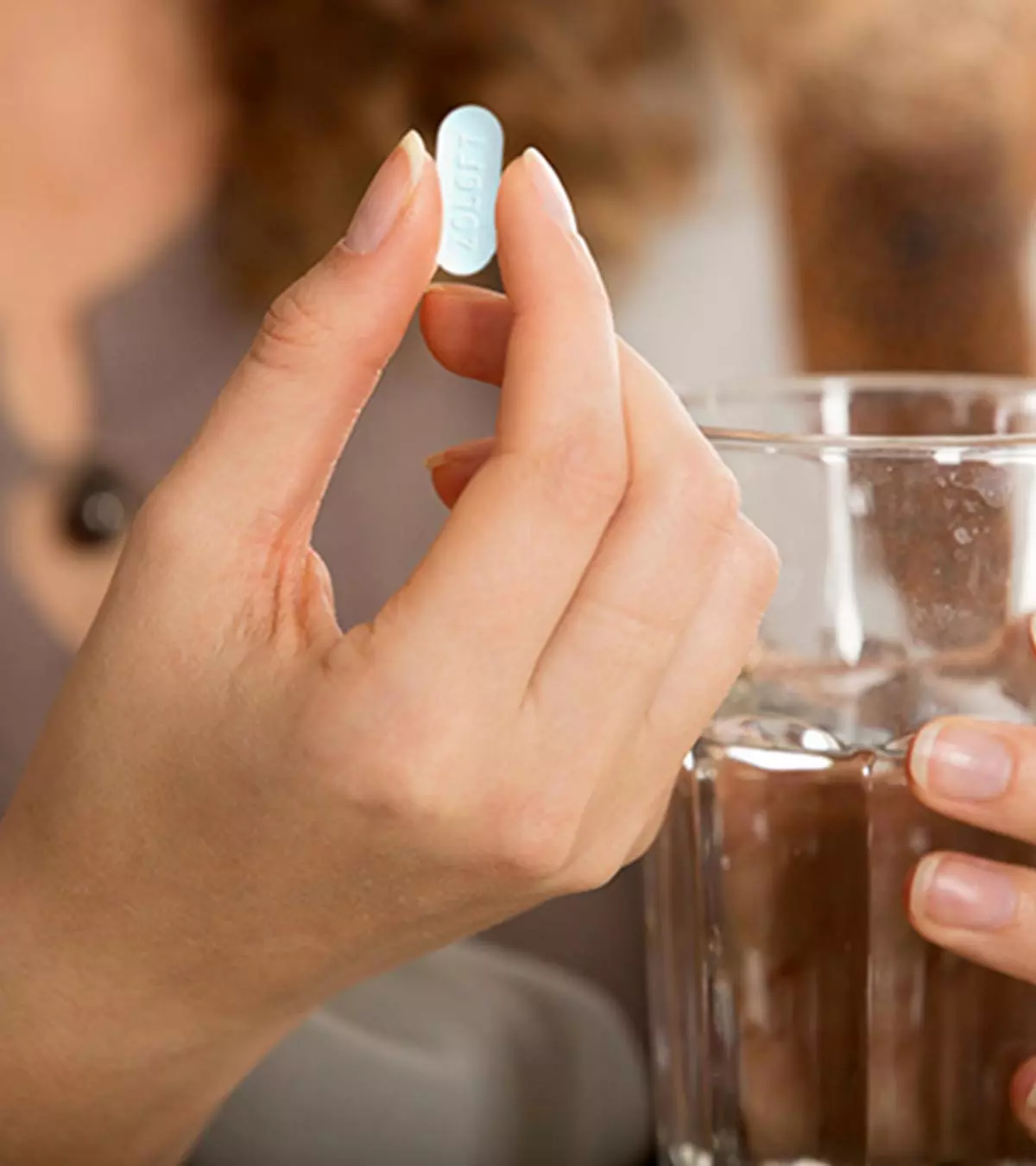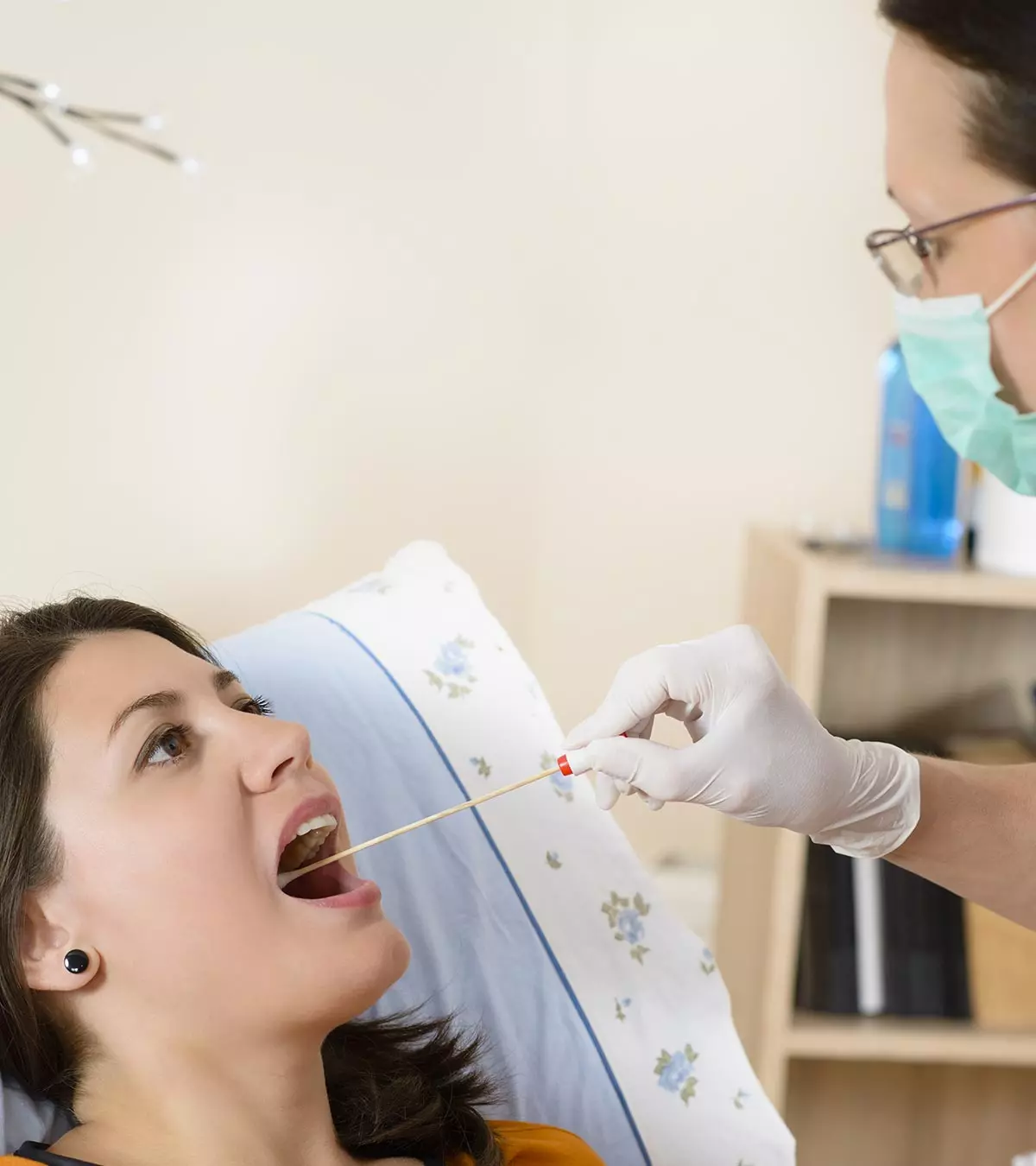
Image: ShutterStock
Breastfeeding mothers are often encouraged to follow a diet rich in fruits and vegetables to provide sufficient nutrition to their little ones. In this regard, drinking prune juice while breastfeeding may be a good way to ensure your energy and nutrients are replenished while feeding your baby. Read this post to learn about the safeness and health benefits of consuming prunes and prune juice while breastfeeding.
Key Pointers
- Prune juice is dried plum juice packed with nutrients and vitamins that help you meet nutritional needs during breastfeeding.
- Consuming moderate amounts of prune juice while breastfeeding helps to improve digestive issues and bladder functions and regulates weight gain in mothers.
- Prune juice also promotes cardiovascular health, provides muscle strength, and protects from osteoporosis.
What Are Prunes?
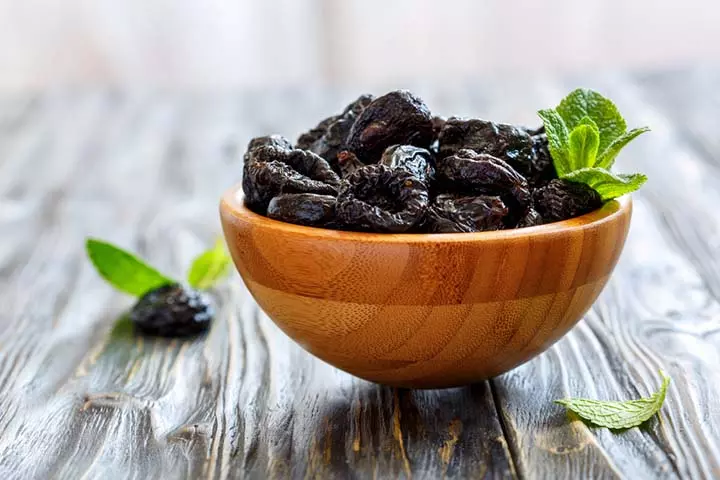
Image: Shutterstock
Prunes are dried plums, popular as European Plum. Prune juice from dried plums offers essential nutrients and energy. Vitamins, minerals, fiber, and other nutrients present in prunes may help prevent health problems during lactation (1). Prunes are particularly rich in vitamins K and A and potassium, which are essential for maintaining a healthy body when breastfeeding (13).
Is It Safe To Eat Prunes Or Drink Prune Juice While Breastfeeding?
Yes, you can drink fresh prune juice and eat prunes while breastfeeding your infant. Drinking prune juice while nursing helps prevent and treat disorders like constipation, thus promoting digestive health. However, an excess of prunes or its juice can have a few side effects. Have a word with your doctor before you include prunes in your diet (2).
 Did you know?
Did you know?Health Benefits Of Drinking Prune Juice While Breastfeeding
High nutritional content in prunes helps you stay fit and healthy while nursing your baby
. Here, we list some prominent health benefits of drinking prune juice while breastfeeding.
1. Helps treat constipation

Image: Shutterstock
High fiber content in prunes helps prevent or treat the troubles resulting due to constipation during breastfeeding. Fresh juice of the nutritious fruit acts as a stool softener and promotes smooth bowel movements. Drinking prune juice also prevents hemorrhoidsiSwollen and enlarged blood vessels around the rectum and anal region , which develop due to chronic constipation (3).
Pediatrician Dr. Bidisha Sarkar opines, “Prunes are known for their laxative properties and many mothers have found that drinking prune juice can help aid digestion for their baby when they are having difficulty passing stool. There is no definitive answer as to how effective this method is since every baby’s digestive system is unique.”
2. Regulates bladder functions
Constipation may result in compression over the urinary bladder and increase the frequency of urination. You can find it difficult to regulate an overactive bladder. Prunes prevent constipation and promote normal functioning of your bladder while breastfeeding.
3. Promotes nerve impulses

Image: Shutterstock
Prunes are rich in mineral potassium. Potassium is a vital electrolyte that is essential for transmission of nerve impulses for carrying out various body functions. Drinking prune juice while breastfeeding will boost the health of your nervous system and promote healthy body functions (4).
4. Regulates weight gain
You can manage your weight by consuming dried plums while breastfeeding. A good intake of prunes helps you feel full for a long time, suppresses your hunger pangs, and regulates your weight gain. Also, prunes contain a very low amount of fats that prevent you from turning obese while you are nursing your dear little one.
 Be watchful
Be watchful5. Prevents anemia
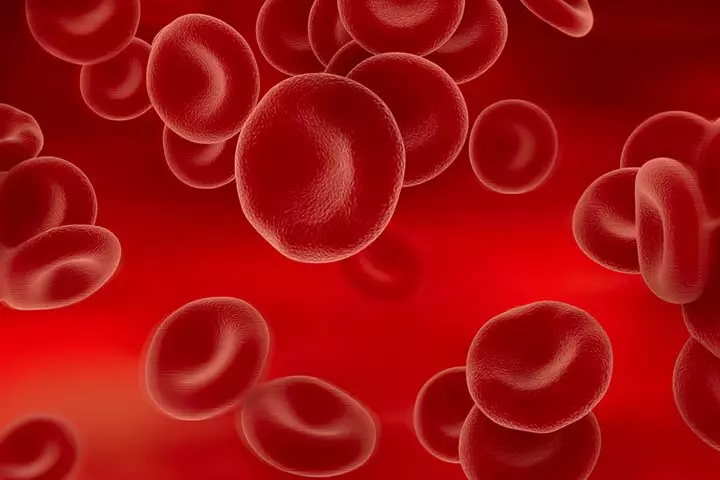
Image: Shutterstock
Prune juice is an excellent source of iron. Adequate intake of prune juice helps increase the amount of iron in your body. Good hemoglobin helps prevent the risk of effects of anemiaiA health condition characterized by low levels of red blood cells and hemoglobin levels in the body , such as fatigue, shortness of breath, and irritability (5)
6. Minimizes plaque deposition in arteries
You suffer from atherosclerosis, narrowing of arteries, due to plaqueiA layer of cholesterol and other fatty deposits on the arterial walls, leading to heart ailments deposition. As a result, you suffer from the shortage of blood and oxygen to your body tissues that can lead to heart failure, heart attack, or stroke. Drinking prune juice is highly effective in slowing down the development of atherosclerosis. Potassium in prunes helps regulate your blood pressure substantially and prevents the risk of heart problems while breastfeeding (6).
7. Promotes muscle health

Image: Shutterstock
Prunes are a rich source of boron minerals and potassium. Potassium promotes smooth muscle contractions, and boron helps in building strong muscles and bones while breastfeeding. Drinking prune juice may also help treat osteoporosisiA condition that makes the bones brittle and weak and more prone to fractures substantially (13).
8. Helps manage sugar levels
Prunes have a lower glycemic index (GI) and are rich in fiber, making them a healthier snack option when it comes to managing blood sugar levels. Foods with a low GI are generally considered better for managing blood sugar as they lead to slower increases in blood glucose (7). Consuming prunes may contribute to a feeling of fullness, thereby reducing the urge for unnecessary snacking throughout the day. As per research, prunes do not cause a significant spike in blood glucose and insulin, making them a suitable and satisfying snack for individuals with diabetes (8).
9. Keeps you hydrated and supports lactation
Prune juice can help you maintain your hydration and energy levels. Staying hydrated is vital for milk production, and the nutrients in prune juice may also support overall lactation efforts.
Frequently Asked Questions
1. Are prunes more effective in treating constipation than prune juice?
Eating whole prunes may be more effective than consuming prune juice. Whole prunes have higher sorbitol and fiber content that can add bulk to stool and act as natural remedies for maintaining healthy bowel movement (9).
2. Will drinking prune juice while lactating cause gas in breastfed babies?
Breastfed babies can get exposed to sorbitol, a sugar in prune juice, which can pass into the breast milk. While some babies have no problem in the digestion of this sugar, others may develop gastrointestinal issues such as gas.
3. Can I mix prune juice and breast milk?
According to Dr. Sarkar, “Mixing prune juice with breast milk can make the prunes easier to digest for your baby and can help reduce the risk of gas. If you are going to mix prune juice with breast milk, it is important to make sure that your breast milk is not too hot as this may scald the prunes and cause them to be difficult to digest.” Alternatively, you can prepare prune puree for babies using formula or expressed breast milk.
4. Can I drink prune juice while breastfeeding if I have a history of gastrointestinal issues or allergies?
You can consume prune juice while breastfeeding if you’ve had gastrointestinal problems. It may aid in relieving constipation but could also lead to increased flatulence (10). Therefore, it’s best to talk to a healthcare professional if you have allergies before drinking prune juice while breastfeeding for personalized advice.
5. Can drinking prune juice while breastfeeding affect my milk supply?
There is no conclusive evidence indicating that consuming prune juice during breastfeeding could impact milk supply. Nevertheless, it is crucial to maintain a balanced diet and stay hydrated to facilitate optimal milk production while breastfeeding. If you have concerns, you may seek guidance from a healthcare professional or lactation consultant.
6. How long after prune juice will I poop?
Drinking prune juice may promote bowel movements because it has abundant sorbitol, fiber, and polyphenols. Although the onset of its laxative effect varies, a study revealed that individuals who consumed the juice might have bowel movements in three weeks with no reported adverse effects (11).
7. Is prune juice effective for treating urinary tract infections?
Prunes provide fiber and nutrients, but there’s no scientific proof they treat UTIs. Some sources propose that juices like prune juice may increase urine acidity, which in turn may help combat UTI (12). Staying hydrated and having a balanced diet, including nutrient rich foods such as prunes, may indirectly support overall health and recovery from infections. However, timely medical advice is crucial for UTI treatment.
8. How can a breastfeeding mother’s diet affect her baby’s digestion?
Certain foods such as spicy or highly processed foods, high mercury fishes, chocolate, and caffeine can affect the composition of breast milk, which can further influence the baby’s bowel movements and cause gassiness and allergies. Thus, try to consume a balanced diet with plenty of fruits, vegetables, and whole grains.
Prunes are a popular remedy for constipation for adults and kids. Prune juice helps regulate bladder function, promotes healthy body functions, serves as a healthy snack, controls weight gain, is a good source of iron, and promotes muscle and colon health. It also helps treat osteoporosis, reduces the risk of cardiac problems, and regulates blood pressure. Like everything else, you should consume prunes in moderation. It is better to consult a nutritionist to know the safe amount of prunes you can consume when breastfeeding.
Infographic: Advantages Of Drinking Prune Juice While Breastfeeding
Prunes are renowned for the laxative effects they have on the body. These dried plums offer many key nutrients to the body. Breastfeeding mothers will benefit greatly from including prune juice in their daily diets as they are a concentrated form of goodness. Read this infographic to uncover its immense health advantages.

Illustration: Momjunction Design Team
Illustration: Amazing Health Benefits Of Drinking Prune Juice While Breastfeeding

Image: Dall·E/MomJunction Design Team
Learn how to incorporate prunes and apricots into your diet for improved gut health! Discover the benefits of these delicious fruits and how to make them part of your daily routine.
References
- Choose MyPlate: Daily Amounts During and After the Pregnancy.
https://health.mo.gov/living/families/wic/pdf/ChooseMyPlateFlyer912.pdf - Pregnancy & Breastfeeding.
https://hgic.clemson.edu/factsheet/pregnancy-breastfeeding/ - Sun Hwan Bae; (2014); Diets for Constipation
https://www.ncbi.nlm.nih.gov/pmc/articles/PMC4291444/ - The Medicinal Properties of Prunes.
https://trove.nla.gov.au/newspaper/article/64164568 - Anemia; Treatment and Management.
https://www.nhlbi.nih.gov/health/anemia/treatment - Nancy J Aburto et al. (2013); Effect of increased potassium intake on cardiovascular risk factors and disease: systematic review and meta-analyses.
https://www.ncbi.nlm.nih.gov/pmc/articles/PMC4816263/ - Fruit
https://diabetes.org/food-nutrition/reading-food-labels/fruit - M Stacewicz-Sapuntzakis; (2013); Dried plums and their products: composition and health effects–an updated review.
https://pubmed.ncbi.nlm.nih.gov/24090144/ - M Stacewicz-Sapuntzakis et al. (2001); Chemical composition and potential health effects of prunes: a functional food?
https://pubmed.ncbi.nlm.nih.gov/11401245/ - Laura Piirainen et al.
(2007); Prune juice has a mild laxative effect in adults with certain gastrointestinal symptoms - Prune juice for constipation? A new study says yes
https://www.health.harvard.edu/staying-healthy/prune-juice-for-constipation-a-new-study-says-yes - Gas in the Digestive Tract
https://www.hopkinsmedicine.org/health/conditions-and-diseases/gas-in-the-digestive-tract - Taylor C Wallace; (2017); Dried Plums, Prunes and Bone Health: A Comprehensive Review.
https://pmc.ncbi.nlm.nih.gov/articles/PMC5409740/
Community Experiences
Join the conversation and become a part of our nurturing community! Share your stories, experiences, and insights to connect with fellow parents.
Read full bio of Dr. Surabhi Sangwai
- Dr. Bidisha Sarkar is a pediatrician with nine years of experience. She did her graduation in Medicine from NRS Medical College, Kolkata and holds specialization in Pediatrics. Dr. Sarkar currently practices at KIMS Hospital in Hyderabad, India.
 Dr. Bidisha Sarkar is a pediatrician with nine years of experience. She did her graduation in Medicine from NRS Medical College, Kolkata and holds specialization in Pediatrics. Dr. Sarkar currently practices at KIMS Hospital in Hyderabad, India.
Dr. Bidisha Sarkar is a pediatrician with nine years of experience. She did her graduation in Medicine from NRS Medical College, Kolkata and holds specialization in Pediatrics. Dr. Sarkar currently practices at KIMS Hospital in Hyderabad, India.
Read full bio of Jessica Albert
Read full bio of Rohit Garoo
Read full bio of Anindita Ghatak













